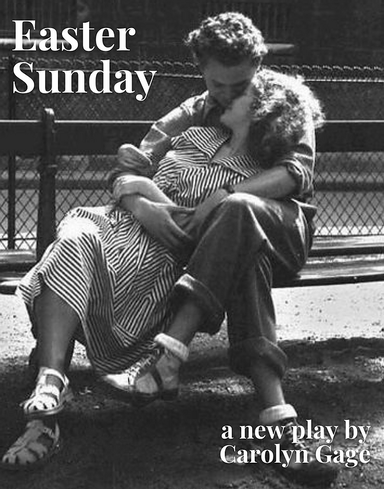Easter Sunday
Paperback
eBook (PDF)
eBook (EPUB)
Kindle

- 2022, excerpt read at Stonecoast Writers Conference, Freeport, ME.
- 2022, excerpt published in Best Women's Monologues, 2022 Anthology, Smith and Kraus.
- 2021, (excerpt), PlayGround Experiment Faces of America Monologue Festival. (National semi-finalist)
- 2021, Clutch Productions, NYC (zoom livecapture)
- 2021,12th Women Playwrights International Conference, Montreal. (cancelled, pandemic)
- 2020, 2Cents Theatre Group's Acting Out INK Fest, Hollywood, CA. (cancelled, pandemic)
- Excerpted, 100 Monologues from New Plays 2021--Women, Applause Books, NYC. CANCELLED due to pandemic.
- Dublin International Gay and Lesbian Theatre Festival
- Semi-staged reading, Portland, OR.
- Semi-staged reading with Julia Reddy, Highlands Inn, Bethlehem, NH.
It’s a sunny Easter morning in Morningside Park, New York, 1960. Del and Flora, a working-class butch-fem couple, are on their way home from a service at St. John the Divine. They are laughing, singing, and enjoying their love when Del begins to pressure Flora into telling her “coming out” story. Flora becomes distressed and evasive.
Later, they are on the doorstep of a brownstone in Greenwich Village. Del wants Flora to meet a mysterious someone. It turns out that this someone is Marty Mann, the founder and spokeswoman for the National Council on Alcoholism. Del knows her from AA meetings. Del is trying to buy a summer cottage in Cherry Grove, the lesbian summer colony outside of the city, but the owner is refusing to sell to her because of class prejudice. Del is hoping that Marty Mann will put in a good word for her. Flora, badly burned by her experiences with the upper class, becomes very upset when she discovers Del’s mission, but Del make a case for staying and rings Marty’s doorbell.
When Marty appears half-dressed and clearly hungover, Flora exits. Del invites herself in, and the scene shifts to the interior of the apartment. Marty is in the middle of a two-week binge, and, in spite of Del’s prompting, she refuses to contact her Alcoholics Anonymous sponsor or reach out for help. Marty’s position is that she is too important to the recovery movement to have it known that she has relapsed.
When Del brings up the reason for her visit, Marty gives her a lecture justifying class segregation and housing discrimination in Cherry Grove. Del becomes aggressive, threatening to contact Marty’s sponsor. There is a physical confrontation over the phone, and Marty falls, injuring a bad hip.
Del immediately abandons her aggressive stance and offers to help Marty. Del reaches for the phone, this time to call her own Alcoholics Anonymous sponsor. The phone call takes a surprising turn, as Del recognizes that she has lost track of her own priorities in dealing with a relapsed alcoholic.
Del starts to leave, on her way to a meeting, when Marty reveals a surprising truth about her life mission. There is a moment of authentic connection before Del’s exit. Alone again, Marty rises slowly, allows some light from the window into the darkened room. She makes a call to friend, asking her if she can stay at her farm for a couple of weeks while she recovers from “the flu.”
3 women, 30's-55
3 scenes
90 minutes
